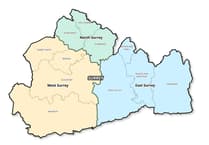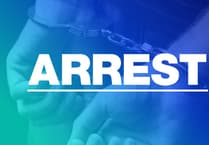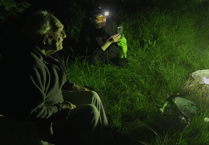RESIDENTS living near the Alton-Farnham railway line are celebrating the end of a nightmare after the rail companies silenced the intolerable noise of train horns at night. Hundreds of people living within earshot of the line have suffered disturbed sleep caused by noisy horns for almost two years, but from last Saturday, April 7, trains no longer routinely sound their horns between 11pm and 7am, while between 7am and 11pm, trains will normally only use the lower tone of the two-tone horn when passing whistle boards. The ordeal for local residents began when old British Rail rolling stock was replaced with Desiro trains. With their horns installed beneath the trains, the sound tended to be distributed sideways making it louder. Up to four trains an hour sounded their horns at about 130 decibels as they approached unmanned footpath crossings. The noise drove residents to launch a desperate campaign for a radical reduction in noise levels, the banning of horns at night, and a change in the tone of the horns. Reaction to the news has been positive, but cautious. Ken Carter, chairman of Binsted Parish Council, and a key campaigner, believes a battle has been won, but not the war, saying: "I am somewhat pleased. It's good, but the bad news is that it appears the volume of the low tone is to be wound up, so it will be noisier than the low tone but quieter than the high tone." The current horns distribute 360-degree sound, but broadband horns focus the sound forwards, lending a softer and less pervasive tone. Mike Nicolle from Bentley, who has a whistle board at the end of his Station Road garden, said: "It's a great relief. In the past, it's been absolutely dreadful. You were either woken up with a terrible jolt or you just lay awake waiting for the next. "It will be a tremendous improvement although it won't help people who do shift work or folk who want to get their kiddies to bed early." James Arbuthnot, MP for North East Hampshire has also welcomed the news of the night-time ban. "There will be many, many residents in North East Hampshire who will be very pleased at this news. And especially so as summer approaches when people will have windows open and spend more time outdoors. "Residents living within earshot of this intolerable noise nuisance have always said that a night-time ban would be the single most important remedy. "The rail industry is awash with arcane rules and, understandably, is also very risk averse. But a small all-party group of MPs, including myself, have pursued the Government on this issue for literally years with meetings, assessments, reports, recommendations and consultations to solve what would seem to be a relatively straightforward problem. "I am really pleased that we have been able to shift the balance in favour of maintaining the quality of life of local residents rather than adhering to rigid rail industry rules and procedures. Common sense has prevailed." The change is the result of a one-year review of the impact of train horns on railway neighbours, and the safety of crossings, of which there are 1200 across the country with whistle boards. The review involved passenger and freight train operators, Network Rail, Rail Safety and Standards Board (RSSB) and the Office of Rail Regulation. The RSSB says: "This change will benefit neighbours of the railway who can be disturbed by the noise. "For those people who use footpath crossings, between these hours the standard notice at all footpath crossings remains the same – 'STOP, LOOK and LISTEN', and users are encouraged to take extra care when crossing between these times." Network Rail is now conducting a prioritised risk assessment to consider whether any crossings require additional measures. The RSSB says that not all rolling stock is able to sound the 'low tone' only, but where they can, drivers will be instructed to do so when passing whistle boards. An e-petition calling for the installation of broadband horns can be signed at http://www.petitions.pm.gov.uk/trainhorns/">www.petitions.pm.gov.uk/trainhorns/.



